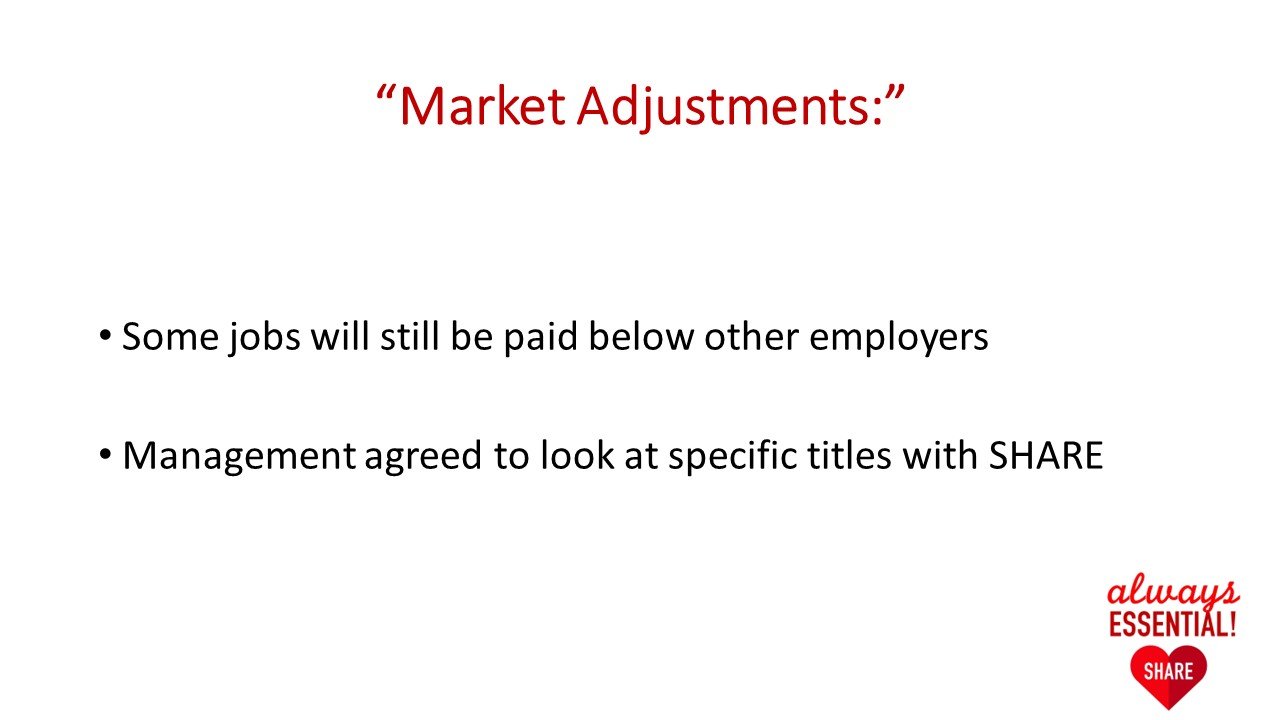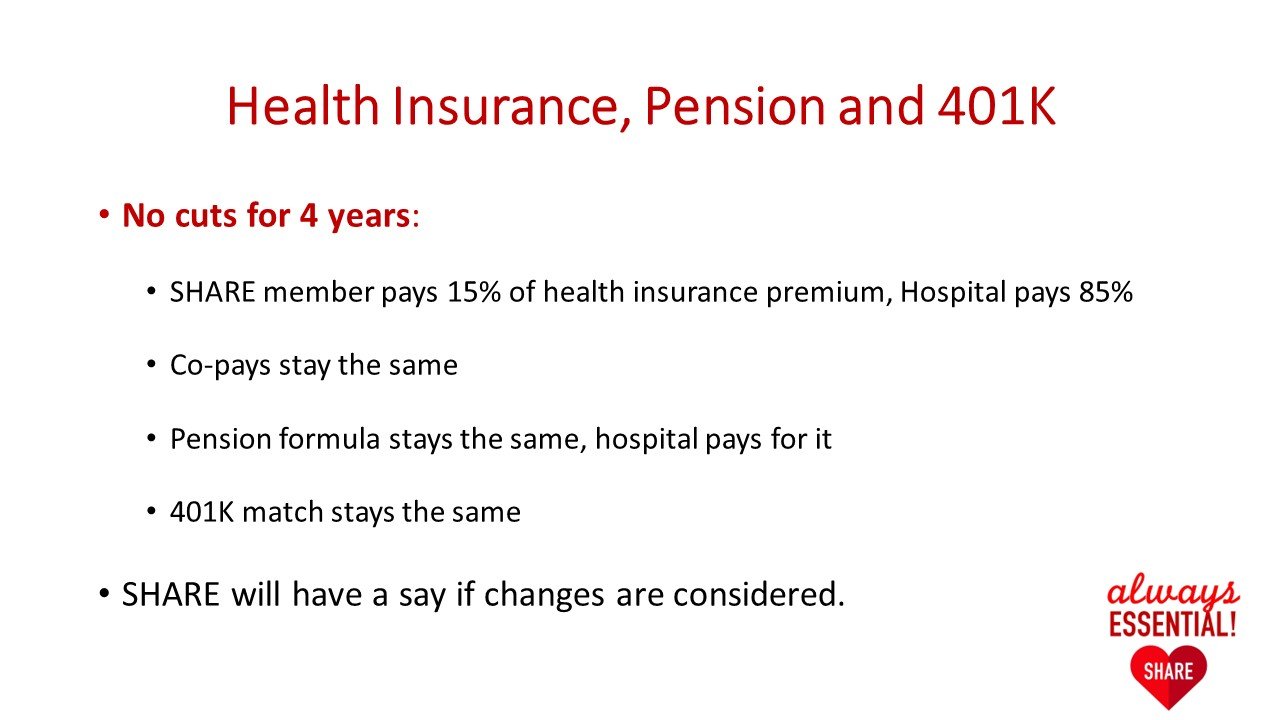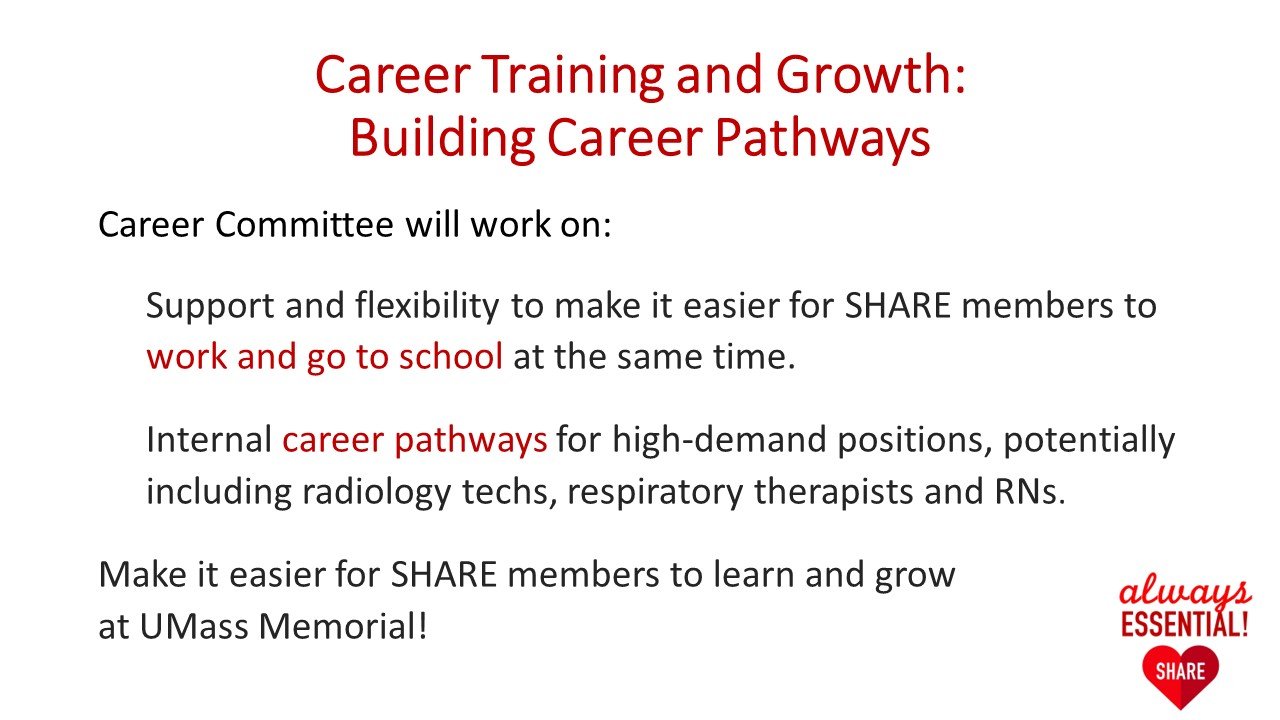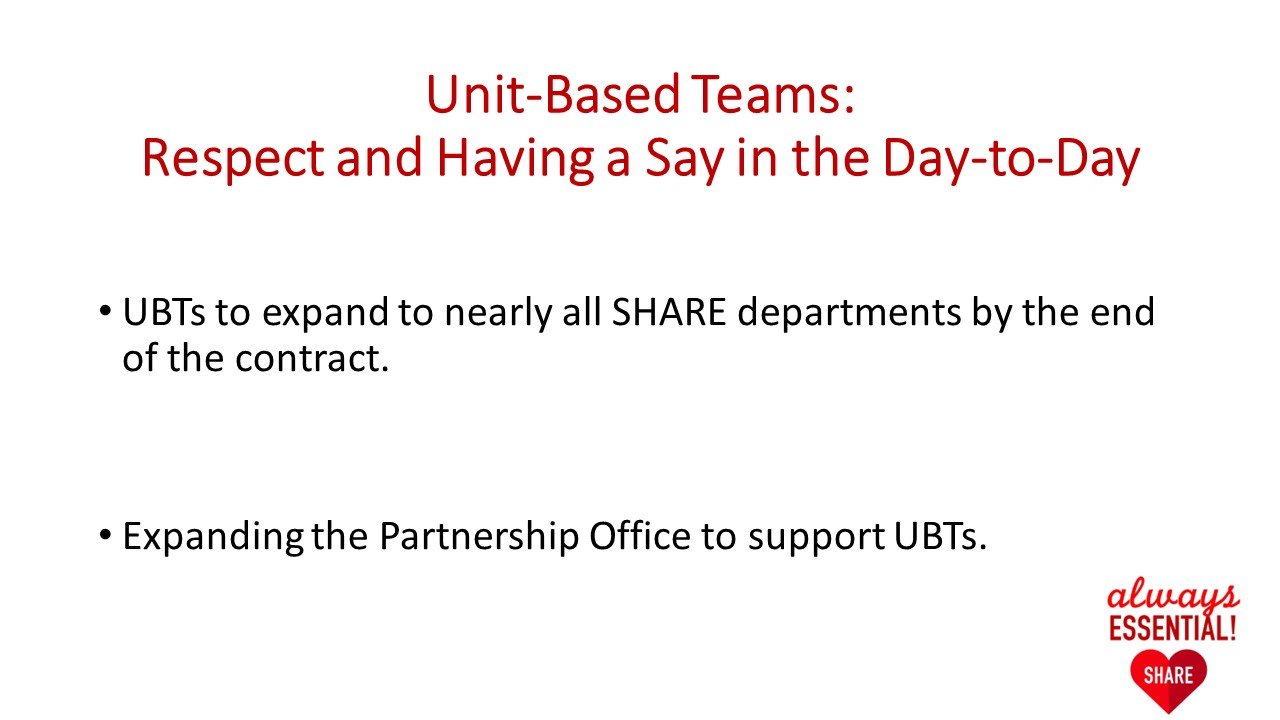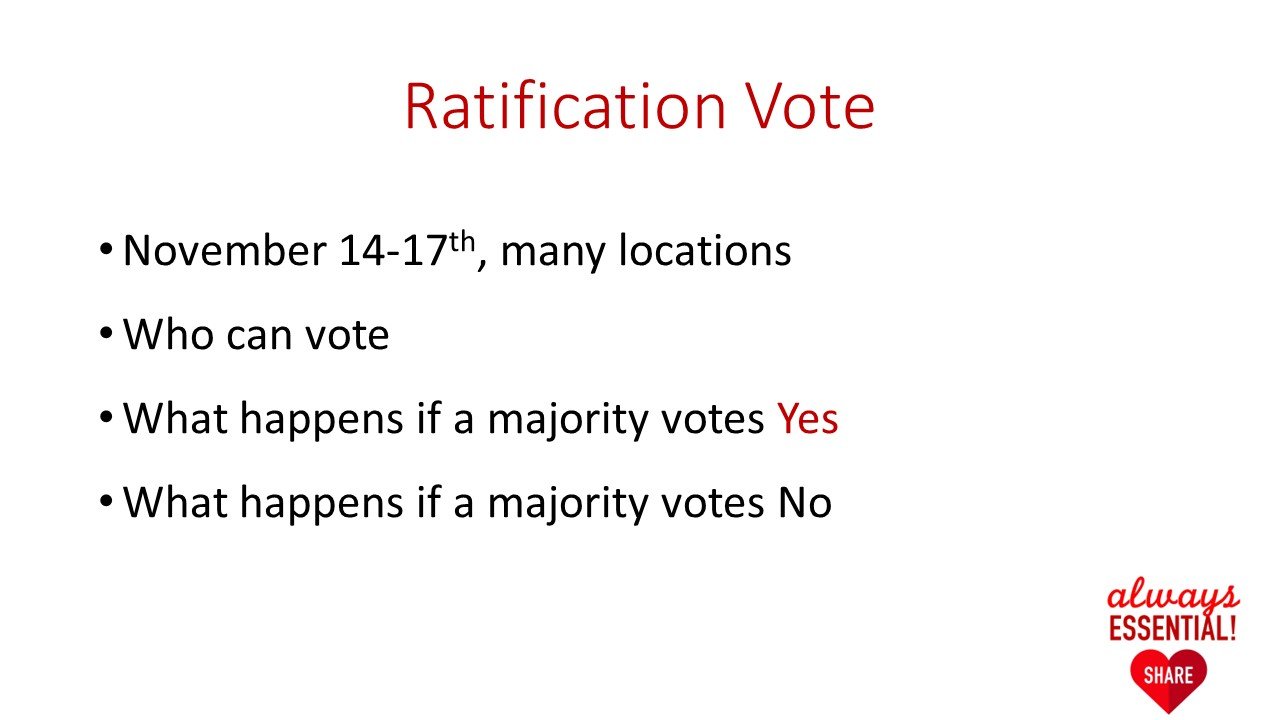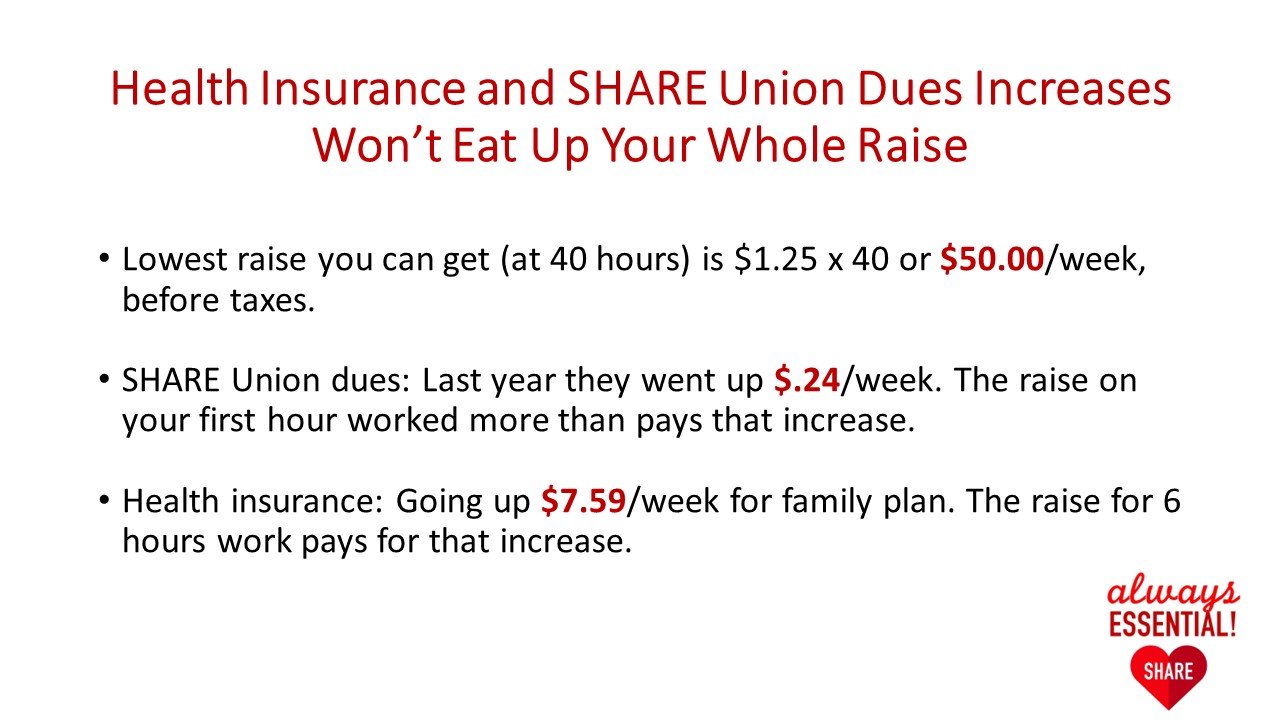Frequently Asked Questions
About the 2022 Contract Bargaining Agreement
-
In the months leading up to negotiations, SHARE’s negotiating team developed its priorities through a series of surveys and thousands of individual conversations with members. SHARE leaders also researched and consulted with experts about relevant subjects like inflation and the job market. Among SHARE’s 3000 members, there was a very broad range of opinions about what a responsible raise proposal would look like, but there was general consensus about what a good raise would need to do. Accordingly, SHARE’s negotiating team made an initial proposal designed to:
Take inflation and the rise in cost-of-living expenses into account
Make sure SHARE members make progress every year as their experience grows
Catch up to what other employers are paying so that UMass Memorial can hire and fill positions, so SHARE members aren’t so short-staffed
Deal with the fact that the rising minimum wage in Massachusetts, added to the national staffing shortage, makes it especially hard to retain staff
Recognize SHARE members’ hard work during COVID and now – SHARE members are Always Essential!
Although management agreed with many of these principles, they did not agree to the raise amounts that we proposed. The final raise numbers are a result of negotiating. The SHARE team believes this is the best deal we are able to negotiate.
-
The raises in this contract needed to be meaningful. Accordingly, the raise percentages and “floors” are bigger than SHARE has ever before negotiated.
SHARE raises stand up when compared to non-union raises, and recent raises negotiated by the Mass Nurses’ Association (MNA) and United Food and Commercial Workers International Union (UFCW).
With compounding, the raises in this contract total a minimum of 21% for each SHARE member.
-
Yes. From SHARE’s perspective, it’s always been true that SHARE members deserve better pay and benefits. In our 25 years, we’ve worked hard together to hold on to the good things that we’ve got (especially health insurance and the pension), and to make financial progress. We’ve done that primarily by negotiating respectable raises every year.
We’ve also developed a pay structure that allows all members to keep moving forward, and mitigates many of the worst effects of favoritism and systemic bias. And we’re continually working to create more opportunities for members to have a say and design systems that make it easier to do work that you can feel proud of.
Still, there’s much work ahead of our union, and we’ll keep at it.
-
SHARE and UMass Memorial both recognize that the market has changed significantly since the beginning of the pandemic, and agree that some jobs need to be reevaluated against the current market, especially given how hard it is to staff-up amid the current healthcare workforce shortage. SHARE will continue to advocate for compensation analyses for members. In some areas, this may provide some bump in addition to the contractually negotiated raises.
If you know details about what other local competitive employers have to offer, you can help SHARE make the case by filling in the online Competitive Compensation Research Form.
One common misconception is that the “platform” you’re on should be equal to the years of experience that you’ve got in the field. The platform number does not necessarily correlate to a number of years or of service. Although the platforms are used by the hospital’s Compensation department to place new hires, there are reasons that the numbers may not correspond, including promotions and transfers.
Sometimes, there are errors. Your area SHARE organizer can help you sort through those with Payroll.
-
No. But it’s a good question. To see how the math works out, look to the box on this page entitled “Health Insurance and SHARE Union Dues Increases Won’t Eat Up Your Whole Raise.”
Most years, there is a small increase to union dues at the beginning of the year. Those rates are set by our parent organization, AFSCME. We haven’t heard anything yet about next year. At the beginning of 2022, members experienced an increase of twenty-four cents per paycheck, or slightly more than ½ cent per hour, which is typical.
-
The date that a raise takes effect is always a subject of the negotiating process.
Traditionally in SHARE, when our union negotiations go beyond the end of a contract period — and therefore the date when members logically expect a raise — the amount of back pay, or “retro,” becomes a subject of bargaining.
In past negotiations, SHARE has often, but not always, negotiated for retro . . . not if we can get something better. In this case, delaying 6% for one month was more money in people’s pockets than what management proposed. (One example they proposed was splitting the raise up, so that there would be smaller raises that came over the next six months. Another way of thinking about this is that, for example, a 5.5% raise on October 1 would be the same money this year as 6% on October 30th. But next year, 6% would be better.)
The SHARE 2022 Negotiating Team
There’s no change to our agreement about health insurance — the hospital will continue to pay 85% of the premium through this contract. Still, the total cost of health insurance is going up this year. We expect union dues will also increase slightly, too, as usual. Here’s how the math works out.
Committees established in negotiations will continue to develop education and career training programs, and systems to help members take advantage of them.
Slides from the SHARE Information Meetings











